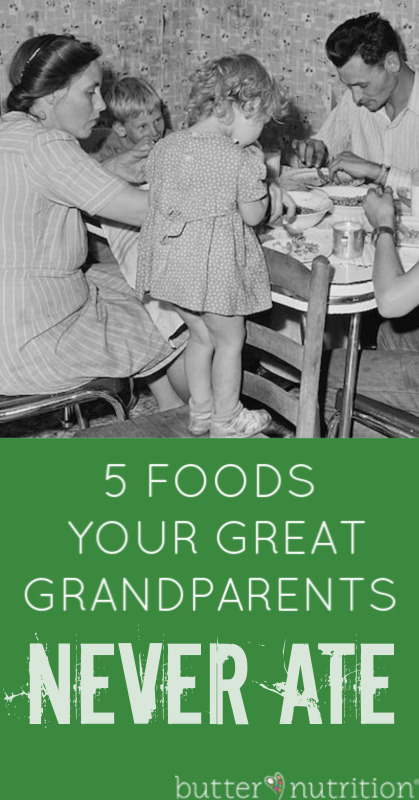
Apart from highly processed foods, what other common foods (even "health" foods) are really screwing us up when compared to the wisdom our ancestors?
Here are five popular health foods that your great grandparents probably wouldn't touch (perhaps even with a 10-foot pole)...
1. Kale and the Salad Bar
If you eat a so-called perfect dietary trifecta of kale, nuts and quinoa with hopes of becoming a green goddess, good luck. With kale relatively new on the food scene in the last decade, eating it like it's going out of style is a bit of an experiment. I mean, did you ever consider why your great-grandmother wasn't subsisting on kale Caesars?
According to Stephen Le PhD, scientist and author of 100 Million Years of Food: What Our Ancestors Ate and Why It Matters Today, vegetables were resisted in the human diet for quite a while because they are difficult to digest and contain an assortment of plant toxins.
Le comments, "I think this notion of a salad bar is probably going to disappear in a couple of decades. The idea that we are better off by eating a lot of colorful vegetables… if you showed a salad bar to our ancestors many years ago, they would have shivered at the thought of eating raw vegetables… they would say this is going to make me sick. The whole point of plants is that they are trying to protect themselves from being eaten, and so they produce a lot of toxins." [6]
It is because of these challenges with raw vegetables that cooking them was so important - to neutralize the difficulty of digestion and reduce the plant toxins they contain.
While it's pretty easy to look up any health food and see its nutrition facts, there is more to the story. High nutrition value means next to nothing if you can't actually digest it, absorb it, and neutralize the plant toxins in order for it to have a net-benefit on your health.
2. Herbicide Laden Foods (non organic food)
In 1974 the molecule glyphosate was invented. What is glyphosate? It's the active ingredient in the incredibly popular and widely used herbicide Roundup. Roundup is widely used in GMO crops as well as sprayed on non-organic produce to help increase crop yields and reduce pests.
It's basically in everything you consume in varying amounts depending on if you eat organic or not.
Sounds okay, right?
Wrong. Glyphosate is now entangled in many lawsuits because of its negative health implications. It's also been shown to increase cancer risk and is linked to nutritional depletion (namely, iron, cobalt, molybdenum, and copper). [4,9] This makes glyphosate-containing foods something you definitely want to minimize as much as possible.
While there's no way to completely avoid it, eating organic and avoiding GMOs is the best way to reduce your intake of synthetic herbicides, specifically glyphosate.
3. Protein Powder
In the health and fitness world, protein powders and protein shakes are everywhere making big promises to help you achieve your "ideal" physique. But beneath the hype, high markup, and glamorous marketing of these "magical" powders, they tend to leave you with nothing but empty promises, as well as compromise your detoxification abilities, causing your body to retain toxins rather than excrete them.
To make matters worse, some popular protein shake powders have been found to contain heavy metals such as arsenic, cadmium, lead, and mercury. [8]
Sticking with traditional proteins and the practice of eating the whole animal is a wiser approach.
4. Vegetable Oils
When was the last time your body had a craving for soybean or canola oil?
Let me guess - never?
When was the last time your body craved cream, butter or bacon? Hmmmm.....
This is one simple way your body asks for saturated fats and not for polyunsaturated fats (PUFA).
What's wrong with PUFA fats? They are harmful to all systems of the body, accelerate aging, slow thyroid function (metabolism), disrupt the immune system, and cause oxidative damage. According to Dr. Ray Peat, PhD, "Unsaturated fats cause aging, clotting, inflammation, cancer, & weight gain." PUFA fats are found largely in oils - including vegetable, corn, canola, peanut, flax, and soy oils. The cheapness of these oils makes them an essential ingredient for most processed foods (especially sauces, mayonnaise, candy). These fats are highly processed, unstable, and oxidize very quickly in the body.
Vegetable oils came on the scene in the early 1900's and intake has grown tremendously ever since...
Source: http://www.cnpp.usda.gov/publications/foodsupply/foodsupply1909-2000.pdfLet's do our part to reverse this trend- so be sure to share this post with someone you know who is still using vegetable oils and/or margarine in their kitchen...
5. Multivitamins
Multivitamins are pushed as an "insurance policy" for extra nutrients to fill in an otherwise non-optimal standard American diet, which sounds like a good approach, right? I mean, who doesn't feel safer with insurance?
But what if there isn't actually proof to back up that that is the case? And, what if there is more science to back up the opposite? According to a 2013 article in the Annals of Internal Medicine, the debate about supplements should be over:
"In conclusion, β-carotene, vitamin E, and possibly high doses of vitamin A supplements are harmful. Other antioxidants, folic acid and B vitamins, and multivitamin and mineral supplements are ineffective for preventing mortality or morbidity due to major chronic diseases. Although available evidence does not rule out small benefits or harms or large benefits or harms in a small subgroup of the population, we believe that the case is closed- supplementing the diet of well-nourished adults with (most) mineral or vitamin supplements has no clear benefit and might even be harmful. These vitamins should not be used for chronic disease prevention. Enough is enough." [5]
Our great grandparents also depended on the sun for vitamin D and not some unproven powder in a pill, but that is another article...
While you may disagree with me, perhaps it really is better to trust your great grandparents when it comes down to what you eat or at least accept the consequences if you choose to stray too far from the nutritional wisdom of the past.
Do you agree or disagree? Please share in the comments!
PIN IT:
References:
- https://www.chatelaine.com/health/eat-like-your-grandma-why-you-should-skip-the-kale-salad/
- http://www.glyphosate.eu/glyphosate-basics/history-glyphosate
- http://www.cnpp.usda.gov/publications/foodsupply/foodsupply1909-2000.pdf
- https://www.ncbi.nlm.nih.gov/pmc/articles/PMC3945755/
- https://annals.org/aim/fullarticle/1789253/enough-enough-stop-wasting-money-vitamin-mineral-supplements
- https://www.thetropicalist.press/2018/01/the-ancestral-diet/
- PMS to Menopause: Female Hormones in Context by Dr. Ray Peat
- https://www.consumerreports.org/cro/2012/04/protein-drinks/index.htm
- https://www.sciencedirect.com/science/article/pii/S1383574218300887
- Photo Credit: Richard Hughes, miner, and his family eating.
Also published on Medium.







Peggy says
Really interesting about what our grandparents ate! I guess it's amazing that any of us are still alive with the way most Americans eat.
Catherine says
Agreed Peggy!
Keith says
I agree .
Anna says
Yes it’s true, no wonder why grandparents ylived longer and were strong. About kale, I don’t really like it it’s too hard to digest, in my opinion and my experience, so I don’t eat it
Catherine says
Hi Anna,
I agree 🙂 Kale is one of those things that on occasion is probably okay because food diversity of any kind is good, but I really don't think it lives up to its "superfood" status in the health world...
Abundantly,
Catheirne
KC says
While I totally agree with not eating the things on this list, there are many reasons to look forward and not back at what our great grandparents did or did not do. We are evolving. That’s a good thing. But the article definitely grabs people with the title and gets out the info you intended. I just don’t agree with glamorizing life back then as better than today in general and think it’s dangerous to think that way. I do appreciate all your information and what we are learning in the present. Thank you!
Catherine says
Thanks Kacie for joining the conversation 🙂
What I'm really getting at in this article is to remind people that our eating habits have slowly evolved over the history of humanity, and now we have things changing very rapidly over decades due to "nutrition science" and "superfoods." I think it's important to look forward, but always keep the past in mind at the same time.
Abundantly,
Catherine
Anna D. says
I'd like to balance this comment in another direction. If you don't believe humans are evolving, and that technology is making food less natural, then it makes sense to look back before the onslaught of artificial food-like products were mass-produced and globally distributed. Foods were grown in gardens, produced more near to home, and made from ingredients from a list at home rather than from a factory with preservatives galore.
M says
PUFAs are not the problem. It is the process that turns them into highly harmful oils for our body. PUFAs can be found in flaxseeds, walnuts, hemp seeds, fish (all good for you)
Annelot says
In my country, The Netherlands, we’ve eaten kale since forever! But we eat it cooked with potatoes and mashed, with butter. With bacon bits, slowcooked beef or a smoked sausage. It’s really tasty and warms you right up on a cold winter’s day! So to us it sounds silly to eat raw kale. Way to hard to digest!! I really like your articles, thanks for writing them!!
MF4Mark says
Catherine,
I can see concern for supplements, especially the fat soluble ones but balance is key. Vitamin D needs to be balanced against vitamin A AND vitamins E and K.
BTW, consider my situation. I have darker skin, live in New England and work indoors. When am I going to get enough UV to GET that vitamin D?
What about magnesium? It's crucial, even moreso with all the calcium they dump in our food. I've seen it said 80% of Americans don't get enough. Even if 6ou ate all organic, I doubt you'd get enough Mg because of soil depletion.
IMO, soil depletion is the 800 pound gorilla here. Until we solve that, anything we eat is useless junk. It's so bad that back in the 1930s, the were saying that 90 something percent of us were nutritionally bankrupt. It's pretty bad when you can't meet even the RDA figures.
Carolyn says
Very interesting post! I do have a question about oils, though. Some of us might crave "cream butter and bacon" but how do you cook with these things? How do you, say, stir-fry something as the Chinese have done for such a long time? Are olive oil and coconut oil okay?
Also, I'm curious about the plant toxins you refer to. I know that spinach has oxalic acid in it... what are the other toxins and how do they harm us? I've read your blog for a long time but I guess I haven't put together the pieces yet....
Thanks!
Anthony says
What about organic pesticides used in organic produce? We can't assume just because it is organic it is safe. And there are no real studies done to show whether they are harmful or not.
Susan says
Agreed!
Mary says
With respect to salads, are romaine and leaf lettuces also very difficult to digest? Would salads be better digested if you blanched all the vegetables, especially carrots, broccoli, cauliflower, etc?